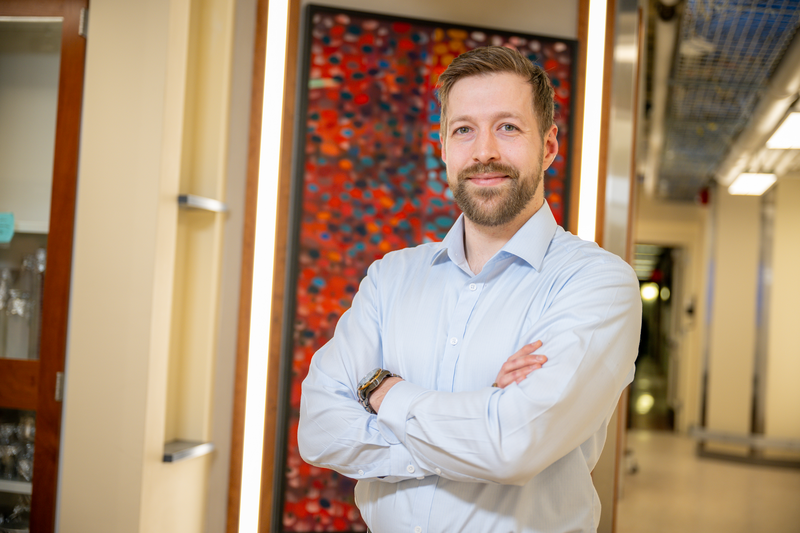Jake Beierle, Ph.D., receives 2025 Paigen Fellowship
Article | February 5, 2025
2025 Paigen Fellow Jake Beierle, Ph.D., uses machine learning technology to study migraine intensity and opioid withdrawal.
“There aren’t many places in the world where you can do cutting-edge research and exist somewhere beautiful.”
That’s postdoctoral associate Jake Beierle, Ph.D., citing one of his many reasons for joining The Jackson Laboratory’s Bar Harbor, Maine headquarters two years ago.
Beierle is the recipient of the 2025 Paigen Endowed Fellowship, an award that recognizes promising postdoctoral talent at JAX. The fellowship honors the late Kenneth Paigen, Ph.D. and Beverly Paigen, Ph.D., two prominent figures in JAX’s history who dedicated their careers to educating the next generation of scientists.
“Jake is a natural leader and astute scientist who embodies the qualities that Bev and Ken valued,” said Beierle’s mentor, Associate Professor Vivek Kumar, Ph.D. “He is well-deserving of this fellowship and will make the Paigen family proud.”
Pursuing ‘a dialogue with science’
Beierle, who earned his Ph.D. in pharmacology from Boston University, was drawn to JAX by the chance to work with Kumar in applying machine learning techniques to genetics research. He said JAX’s exceptional scientific resources combined with its interdisciplinary, collaborative atmosphere make it one of the best places to pursue research.
“When you start learning about science, people teach you what has already been discovered,” he said. “Once you get into a lab, you realize you can actually enter a dialogue with science and contribute to it.”
When he’s not enjoying the splendor of Acadia National Park, honing his homebrewing techniques or expressing his artistic side in a new linoleum-cut relief print, Beierle uses machine learning methods to study mouse behavior as it relates to two human health challenges. One is susceptibility to migraine, a severe and often debilitating form of headache pain. The other is opioid withdrawal.
His work advances one of the Kumar lab’s key goals in using computational tools: to limit human interference in the testing environment, allowing mice to behave naturally and yielding more accurate results for translation to a clinical setting. He hopes to bridge the gap between preclinical research and clinical application by assessing mice in ways that more directly resemble the complaints of human patients.
In his studies of migraine intensity, Beierle develops machine learning tools to measure migraine in mice by assessing changes in dozens of individual behaviors simultaneously. He plans to apply this approach to compare mice that are genetically susceptible or resilient to migraine against a control group. By understanding which genes modulate the migraine, he could identify new therapeutics for patients who do not respond to the currently available treatments.
For his addiction research, Beierle is working to leverage a 24-hour monitoring system to observe and extract information about withdrawal behaviors over a longer period than traditional models allow. He aims to better mirror the timeframe of human withdrawal and hopes this work will generate a model that simulates spontaneous withdrawal, as opposed to an artificially induced state.
The impact of philanthropy
Beierle is excited about the year ahead and about the progress his fellowship will make possible.
“My research is hitting an inflection point at which we’re moving away from tool development and into tool application,” he said. “We’re developing this technology through rigorous controls to prove to ourselves and to the field that our approach is working. Then we can start applying it towards solutions in human health and disease.”
He is grateful to the Paigen family for their generosity, noting that the award will play a key role in empowering him to connect with other researchers who could benefit from the tools he is developing in the lab.
“By going out and talking with scientists who have other disease models to which this technology could apply,” he said, “I’ll be able to establish myself as someone who can develop these next-generation techniques and apply them in ways that will make a difference to the future of human health.”
About The Jackson Laboratory: The Jackson Laboratory is an independent, nonprofit biomedical research institution with a National Cancer Institute-designated Cancer Center and nearly 3,000 employees in locations across the United States, Japan and China. Its mission is to discover precise genomic solutions for disease and empower the global biomedical community in the shared quest to improve human health. For more information, please visit www.jax.org.
